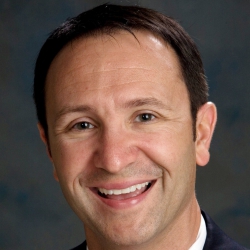Attorney General Jeff Landry of Louisiana was one of five state attorney generals who signed an amicus brief in New Jersey’s appeal to the U.S. Supreme Court in its ongoing sports betting case. New Jersey has challenged the Professional and Amateur Sports Protection Act of 1992 over the past 5 years, but an appeal to the Supreme Court is its last chance to strike down the PASPA law.
The nation’s highest court declined to hear a similar case in 2014, but it asked for the amicus brief a couple of weeks ago. Support from four other states might be one reason for the change in attitude of the Supreme Court, which contains the same justices from that previous rejection of New Jersey’s sports betting case (minus the late Judge Scalia).
The 10th Amendment’s Bearing on Sports Betting
Jeff Landry bases his support for New Jersey’s case on the 10th Amendment, which calls for joint sovereignty between the federal and state governments. As one of the Bill of Rights, the 10th Amendment is considered one of the foundational parts of the US Constitution. The original 13 states would not sign the Constitution until the first ten amendments were added to the document.
The US federal government’s power and authority has grown enormously in the 228 years since the Constitution was signed, but Jeff Landry and the other four attorney generals want to challenge Washington DC on the PASPA law. The 10th Amendment calls for the states to have any power which is not spelled out in the Constitution, which states “the powers not delegated to the United States by the Constitution, nor prohibited by it to the States, are reserved to the States.”
Gambling in the Colonial and Revolutionary Eras
Since sports betting was not spelled-out in the Constitution as a power afforded to the federal government, the 5 governors argue that the PASPA law is unconstitutional. No gambling was discussed in the Constitution. While one might think the Founding Fathers did not trifle with such matters or overlooked gambling laws, it should be noted that the same Founding Fathers helped fund the American Revolution’s war effort by holding raffles and lotteries.
Gale Group wrote, “The first wave of gaming activity (1607-1840s) that occurred in the US began with the landing of the first settlers, but became much more widespread with the outbreak of the Revolutionary War. During this time, lotteries were the approved form of gambling. A few of these lotteries were sponsored by states to help finance their armies.”
Thus, the writers and signees of the Constitution knew full well the fundraising potential of lotteries, as Harvard and Yale Universities ran lotteries in the 1760s. Betting on horse racing was a common in the 18th century, with prominent racetracks operating in East Coast cities like Alexandria, Annapolis, Fredericksburg, and Williamsburg.
George Washington issued orders against gambling in his army’s camps during the Revolutionary War, while British commanders did the same. The Founding Fathers thus knew a lot about gambling, but left the federal oversight of gambling out of the Constitution on purpose.
The Advocate on Jeff Landry’s Thinking
The Advocate wrote a piece on AG Jeff Landry, because he is notably not a proponent of gambling. Also, the Louisiana attorney general has no interest in expanding sports betting to his state. Instead, he signed on to the challenge of the PASPA law because he opposes federal oversight of gambling. Landry sees the PASPA as a vast expansion of federal authority, which could be used to seize authority from states on a variety of other issues.
The amicus brief said that it is not challenging particular sports betting laws passed by the U.S. Congress. Instead, it wants to challenge the Congress’s right to pass any laws on sports betting, whether they are federal bans or federal regulations. The brief states it’s concern is “not with what Congress regulates but how it does so.”
Amicus Brief in the Sports Betting Case
Jeff Landry’s opposition to PASPA is not based on the sports betting provisions, but the assumption the federal government has the authority to pass federal laws like PASPA. The ban or regulations might involve a variety of other issues, besides sports gambling. In the opinion of the five state attorney generals who signed the amicus brief, PASPA “fundamentally alters the nature of federal/state relations“.
New Jersey’s challenge of federal gambling laws have won support from a variety of conservative figures. In the case of Restore America’s Wire Act, a proposed federal ban on online gambling, Former Texas Rep. Ron Paul and current Kentucky Sen. Rand Paul stand against PASPA, because of its expansion of central authority in Washington. Grover Norquist, the famous anti-tax lobbyist and vice president of the NRA, also opposes such Restore America’s Wire Act. Their stances are based on the same concept: the federal government has no right to set gambling laws in the country. Those powers are reserved for the individual states.
The U.S. Supreme Court has not decided whether to hear New Jersey’s case. That decision should be announced in the coming months. If the justices decide to hear New Jersey’s case, then they likely would hear arguments in the summer of 2017, with a decision expected (perhaps) by the end of the year.

